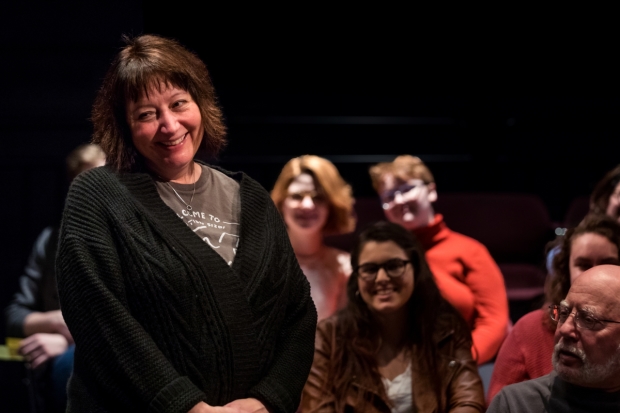Every Brilliant Thing Examines the Ordinary Things That Make Life Extraordinary

(© Maggie Hall)
For some, communal experiences are like a tonic that reminds us we’re all in this together and that none of us are alone. While others might be able to appreciate the life-affirming qualities of such experiences, at the end of the day, it can still feel like kumbayas and group hugs.
In Every Brilliant Thing, writers Duncan Macmillan and Jonny Donahoe’s audience-interactive play, now at SpeakEasy Stage, the audience is very much on the hook, called upon to play bit parts, shout out lines, and — for one unlucky spectator — remove their sock and fashion it into a sock puppet. It’s kind of like a big group hug, or at least that’s the intention.
Works with audience participation are not to my liking – I draw the line at bringing Tinkerbell back to life – so it is not surprising that I failed to be won over by Every Brilliant Thing. This 70-minute solo show tracks one woman’s lifelong crusade to find little things that make life worthwhile, all the while living under the shadow of depression and her mother’s suicide.
The play premiered in 2013 at Ludlow Fringe Festival in the UK and received its North American premiere at Barrow Street Theatre a year and a half later. It is based on Macmillian’s own short story, and was originally performed — both in the UK and in New York — by cowriter Donahoe, a British comedian.
The play’s nameless narrator, played by Adrianne Krstansky, began keeping a list of the little things that make life brilliant after her mother’s first suicide attempt. The list, which was made in no particular order, corresponds to numbers that certain audience members are given upon entering the theater. When Krstansky calls out a number, that member of the audience shouts out their item, which ranges from things like "ice cream" to "staying up past your bedtime to watch TV." We are taken through her college days, her first love, her marriage, and her eventual separation, but for all of the changes in her life, there are two constants: the list and her mother’s mental illness.
The list was started not just as a way for a young girl to cope with the confusion of her mother’s suicide attempt, but also in hopes that she would pass this list on to her mother, who would then realize that there are a great many reasons to stay alive. She does find ways to get the list to her mother, but her mother always returns it to her without any acknowledgement. Eventually, she forgets about the list until her mother’s next suicide attempt a decade later.
That Donahoe was so involved in its creation and development — as well as its initial rave reviews — means that Every Brilliant Thing undeniably plays to his strengths as a stand-up comedian. Krstansky, an actor of extraordinary warmth and heart, is at the center of this mounting. But for all of her gifts, the part requires more earnest showmanship. Krstansky imbues the show with a girlishness that suits the earliest parts of the play, but she is unable to offer the easy magnetism required to distract us from the fact we're watching an underwhelming, featherweight work.
Director Marianna Bassham can never quite help the play hit its stride, instead making it feel clumsy and more chaotic than it needs to be. The play space is stripped down to a small, central playing area that’s completely surrounded by the audience with only the most essential lighting and scenic elements (Eric Levenson is credited as designing both in the program).
There are little morsels of heartrending comforts along the way, but ultimately it’s not enough to make Every Brilliant Thing worth adding to your list.










